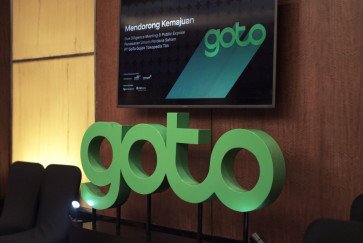Popular Reads
Top Results
Can't find what you're looking for?
View all search resultsPopular Reads
Top Results
Can't find what you're looking for?
View all search resultsThe stakes of Danantara’s investment in GoTo-Grab
For Danantara, the priority should be safeguarding state investment integrity and keeping Indonesia’s digital market open and credible. Acting prematurely or politically could turn strategic capital into reputational risk.
Change text size
Gift Premium Articles
to Anyone
W
hen news surfaced that GoTo and Grab Indonesia were again exploring a merger, the country’s digital market responded with a mix of curiosity and concern.
On paper, the GoTo-Grab business fusion could create powerful synergies in technology, logistics and payments. Yet beneath the headlines lie deeper questions: what could be Danantara’s role in the new entity? How should a state-backed investment arm act in such a corporate action?
Over the past year, Indonesia’s digital economy has entered a phase of consolidation. Start-ups that once symbolized national pride, GoTo, Bukalapak, Tokopedia, are now navigating maturity, competition and rationalization. The next chapter will not be written by founders alone, but by those who finance them wisely. That is why Danantara, established to drive the long-term accumulation of state capital, now stands at a crossroads.
Rumors of Danantara’s investment in GoTo were presented as part of a push to strengthen Indonesia’s digital ecosystem. But with Grab Indonesia’s potential inbreng (non cash- contribution) of assets and Grab Singapore’s position as a GoTo shareholder, the line between national and regional interests is blurring. Structurally, GoTo may appear to own Grab Indonesia, but such arrangements often conceal more than they reveal. What matters most is understanding Danantara’s goal: strengthening Indonesia’s digital backbone, or simply helping existing investors exit gracefully.
The issue ultimately comes down to fairness, transparency and intent. If Danantara’s investment expands capacity, improves technology and nurtures innovation, it will strengthen the economy. But if it merely subsidizes liquidity for private players, it risks repeating past governance failures in Indonesia’s startup ecosystem and exposing Danantara to legal and reputational harm.
Recent state-linked investments have already raised concerns about governance and conflicts of interest, with the Telkomsel-GoTo deal still under scrutiny by law enforcement. When public funds enter high-stakes private deals without transparent disclosure or accountable decision-making, public trust erodes. A GoTo-Grab merger may revive similar concerns unless Danantara’s role is defined with clarity, prudence and accountability.
Several scenarios are reportedly under consideration. In one, Danantara supports a merger where GoTo becomes the surviving entity and Grab the majority shareholder, with GoTo acquiring Grab Indonesia’s assets and market reach through inbreng, while Grab Singapore gains controlling influence as a shareholder.



















